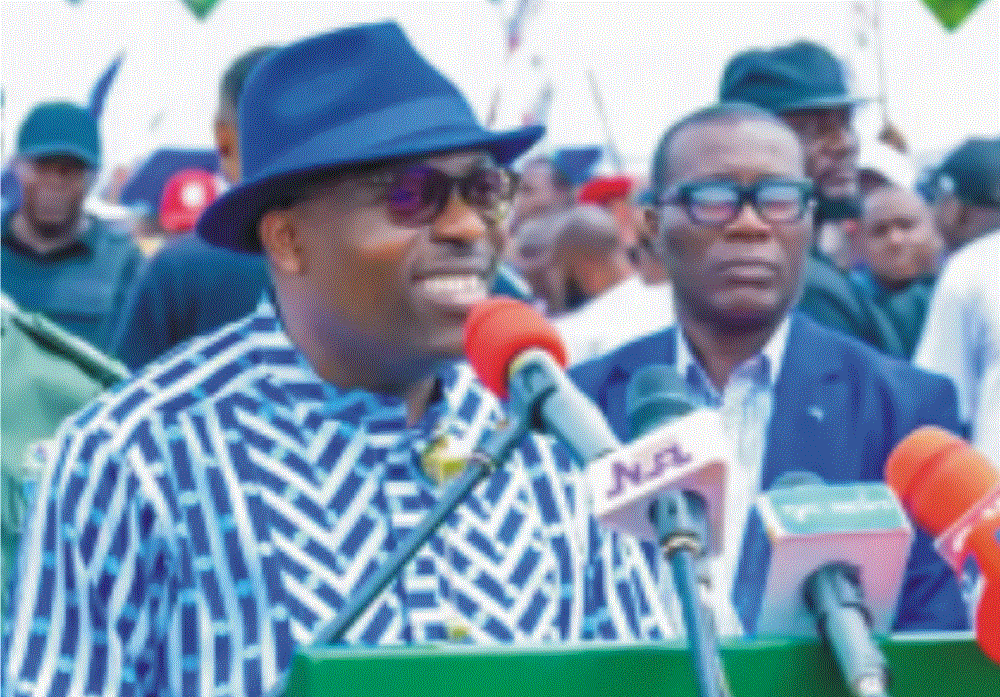Appeal Court Vacates Order Stopping Allocations To Rivers

The Court of Appeal sitting in Abuja vacated the judgement on Monday that had prohibited the Central Bank of Nigeria (CBN) from disbursing monthly statutory allocations to Rivers State.
In a split decision, a three-member panel of Justices ruled two-to-one that the Federal High Court in Abuja lacked the necessary jurisdiction to hear the case that led to the restraining order. The court determined that merely joining federal agencies as parties in the suit did not grant the Federal High Court the authority to hear the matter.
The panel, led by Justice Hamma Barka, concluded that, given the subject matter of the dispute related to the state’s budget appropriation, the Federal High Court in Abuja was not the appropriate venue for such matters. Consequently, the court upheld six separate appeals filed by the aggrieved parties seeking to overturn the high court judgement.
In a dissenting opinion, Justice Adebukola Banjoko affirmed the high court’s order.
The appeals were marked as: CA/ABJ/CV/1277/24, CA/ABJ/CV/1196/24, CA/ABJ/CV/1287/24, CA/ABJ/CV/1293/24, and CA/ABJ/CV/1360/2024.
In addition to Governor Siminalayi Fubara, the appellants included the Rivers State Government, the Accountant-General of Rivers State, and Zenith Bank Plc.
On November 22, Governor Fubara, represented by a team of lawyers led by Mr. Yusuf Ali, SAN, requested the appellate court to hear his appeal marked CA/ABJ/CV/1303/2024 and to nullify the high court order, which he argued was issued in bad faith.
He urged the appellate court to grant his appeal and void the detrimental orders made against the state by Justice Joyce Abdulmalik of the Federal High Court, in her judgement delivered on October 30.
Governor Fubara’s petition coincided with the appellate court’s decision to consolidate all appeals originating from the aforementioned high court judgement.
It is worth noting that the high court had previously restrained the CBN from allowing the Rivers State Government to withdraw funds from the consolidated revenue account. This restraining order stemmed from a suit marked: FHC/ABJ/CS/984/24, initiated by the faction of the Rivers State House of Assembly led by Hon. Martins Amaewhule.
The defendants in this matter included the CBN, Zenith Bank Plc, Access Bank Plc, and the Accountant-General of the Federation, along with Governor Fubara, the Accountant-General of Rivers, the Rivers State Independent Electoral Commission (RSIEC), Chief Judge of Rivers Hon. Justice S.C. Amadi, the Chairman of RSIEC, Hon. Justice Adolphus Enebeli (rtd.), and the Government of Rivers State.
While the appellants petitioned the appellate court to grant their appeal, the Hon. Amaewhule faction, represented by their legal team led by Mr. J. B. Daudu, SAN, requested the court to dismiss the appeals and uphold the high court judgement.
The faction loyal to the former governor and current Minister of the Federal Capital Territory, Mr. Nyesom Wike, had persuaded the lower court to halt all federal monthly allocations to Rivers State, citing Governor Fubara’s non-compliance with a court order requiring him to present the 2024 Appropriation Bill.
Governor Fubara maintained that the Hon. Amaewhule faction had lost their legislative status after defecting from the Peoples Democratic Party (PDP), which had initially sponsored their election, to the All Progressives Congress (APC).
However, the 27 lawmakers contended that the high court, in a ruling delivered by Justice James Omotosho, recognised Hon. Amaewhule as the legitimate Speaker of the Rivers State House of Assembly and invalidated the 2024 budget proposal presented to the four-member faction led by Hon. Victor Oko-Jumbo.
The plaintiffs asserted that the high court’s decision in their favour had been upheld by the appellate court. They alleged that Governor Fubara had continued making unauthorised withdrawals from Rivers State’s consolidated revenue funds, in violation of Section 120 of the 1999 Constitution, as amended.
As a result, the plaintiffs filed an Originating Summons on July 15, urging the court to enforce the fiscal provisions of the 1999 Constitution by restraining the Federal Government and the CBN from disbursing further allocations to the Rivers State Government. They argued that their suit aimed to ensure fiscal integrity and accountability in the use of funds allocated to the state from the federation account.
Despite the defendants, including the apex bank, challenging the competence of the suit, Justice Abdulmalik found merit in the plaintiffs’ case.
The defendants contended that the Abuja court lacked territorial jurisdiction to hear the matter, which they argued should have been filed in the Port Harcourt Division of the Federal High Court.
Governor Fubara specifically accused the plaintiffs of abusing the judicial process and engaging in forum shopping through multiple suits concerning the same issue.
He insisted that the plaintiffs’ seats were declared vacant following their defection to the APC and questioned their locus standi (legal standing) to initiate the action.
The application from the Hon. Oko-Jumbo-led faction of the Assembly to be joined as interested parties in the substantive suit was denied by the trial court.
In her judgment, Justice Abdulmalik remarked that the defendants appeared to have overlooked existing judgments that validated the Hon. Amaewhule-led lawmakers.
She noted that Justice Omotosho’s verdict, delivered on January 22, along with the appellate court’s ruling dated October 10, effectively resolved the issue regarding the plaintiffs’ disqualification. Justice Abdulmalik pointed out that the appellate court held that Governor Fubara’s presentation of the Rivers Appropriation Bill to only four members of the Assembly was a gross violation of Section 91 of the 1999 Constitution, as amended.




